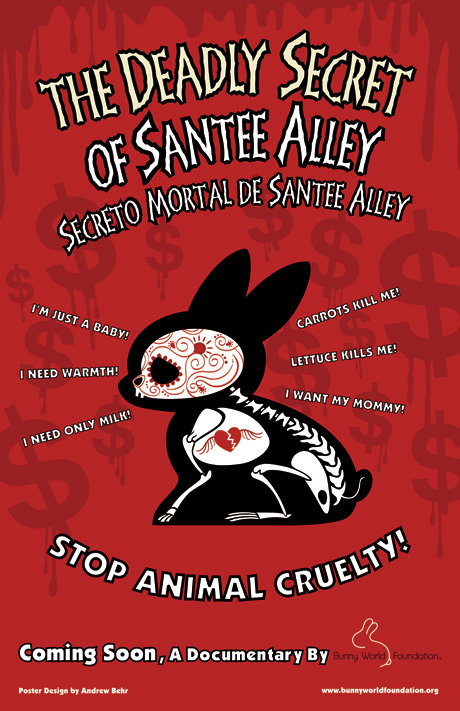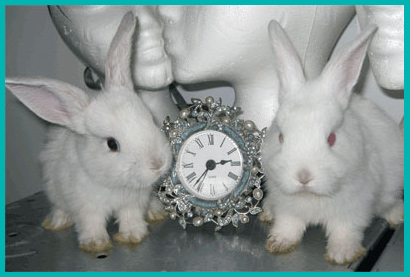What Should I Feed my Bunny?
For Spanish-speaking Bunny Lovers, please refer to www.conejilandia.com - it's an excellent source of information on pet rabbits. Good luck / Buena suerte! 
by Dana Krempels, Ph.D.
The House Rabbit Society stresses that rabbits should live indoors, and have at least four hours of quality running/playing time per day. This, in conjunction with a proper diet, will help keep your rabbit happy, healthy and affectionate for a lifetime. Perhaps the most important items in the rabbit diet that ensure good intestinal health are (1) adequate oral hydration and (2) adequate crude long fiber, which helps push hair and food through the intestines, and keeps the intestinal muscles well toned and moving quickly. This is essential to the rabbit's maintenance of a balance flora (bacteria and yeast) in the cecum. Improper diet can quickly lead to intestinal problems, often originating with cecal dysbiosis, an imbalance of the natural "ecosystem" of the cecum. Here are the most important items that you should be sure to include in your rabbit's diet.
HAY!
Perhaps the single most important item in the rabbit diet is grass HAY, and it should be fed in unlimited quantities to both adults and baby rabbits. A rabbit fed only commercial rabbit pellets does not get enough long fiber to keep the intestines in good working order. The long fibers in the hay push things through the gut and keep the intestinal muscles in good tone. In addition to keeping the intestinal contents moving at the rate at which nature intended, hay may also help prevent intestinal impactions caused by ingested hair or other indigestible items. (For more information on problems associated with slowed intestinal function, please see http://www.bio.miami.edu/hare/ileus.html)
Alfalfa or clover hays, although tasty for the rabbit, are too rich in protein and calcium to be fed ad libitum. Instead, offer fresh grass hays such as timothy, oat, coastal, brome, Bahia or wheat. If you can't find good quality hay locally, you may wish to mail order hay from Oxbow Hay Company or American Pet Diner. Oxbow carries the coarser "first cut" timothy hay that is higher in fiber. American Pet Diner carries both first cut and the softer, more fragrant "second cut". Second cut hay is lower in fiber, but some rabbits who refuse to eat the (putatively healthier) high-fiber first cut will often eagerly accept second cut hay. Less fiber is better than none at all!
PELLETS
A good-quality commercial rabbit pellet provides trace nutrients, vitamins and minerals that a rabbit might not get if fed only hay and fresh foods. However, very little pelleted food is required for good health. Many experienced rabbit veterinarians are now recommending no more than 1/8 cup of quality pellets per 5 lbs. of rabbit per day, and some even consider commercial pellets a "treat food" that can promote obesity in spayed/neutered adult rabbits. A rabbit fed too many pellets will often ignore his hay, to the detriment of his intestinal system!
A good quality rabbit pellet DOES NOT contain dried fruit, seeds, nuts, colored crunchy things or other things that are attractive to our human eyes, but very unhealthy to a rabbit. Rabbits are strict herbivores, and in nature they rarely get fruit, nuts or other such fatty, starchy foods. The complex flora of the cecum can quickly become dangerously imbalanced if too much simple, digestible carbohydrate is consumed--especially if the diet is generally low in fiber. The result is often "poopy butt syndrome," in which mushy fecal matter cakes onto the rabbit's behind. This a sign of cecal dysbiosis, which can foment much more serious health problems.
A good quality rabbit pellet should have at least 22% crude fiber, no more than approximately 14% protein, about 1% fat and about 1.0% calcium. Check the label on the rabbit pellets before you buy. Most commercial pellets are alfalfa-based, which means they're higher in calories and lower in fiber than timothy-based pellets. The latter are available from quality feed companies such as Oxbow or American Pet Diner.
Baby rabbits may be fed unlimited pellets, as their bones and muscles need plenty of protein and calcium for proper growth. However, the calories and nutrients of commercial pellets fed ad libitum exceeds the needs of a healthy adult rabbit, and will not only promote obesity, but discourage the rabbit from consuming enough hay to ensure intestinal health.
The wise "bunny parent" will begin to gradually taper the quantity of pellets once the rabbit is about eight to twelve months old. and feed no more than 1/8 cup per day for every four pounds of rabbit (you can give a little bit more if the pellets are timothy-based). Some rabbit caregivers complain that their rabbits won't eat their hay. If the problem is not medical in nature (e.g., molar spurs and other dental problems are a common problem responsible for "picky eating"), then it may be that the rabbit is eating too many pellets, isn't hungry, and so doesn't eat the hay so vital to his/her health. Take the tough love approach! Cut back the pellets until you are sure your rabbit is eating enough hay.
FRESH VEGETABLES
You may have heard it from a breeder, pet store owner, or even a veterinarian who is not as familiar with recent rabbit health information as one might hope: Fresh vegetables will give your rabbit "diarrhea." Nothing could be further from the truth than this old myth. In fact, fresh greens help keep intestinal contents hydrated, which makes them easier for the bunny to pass. Trace nutrients, fiber, and just plain old tastiness are other benefits of fresh greens. After all, what do you suppose wild rabbits eat?
Fresh, moist greens are about as important as hay in maintaining a healthy intestine. Try broccoli, dark leaf lettuces, kale, parsley, carrots (with tops!), endive, escarole, dill, basil, mint, cilantro, culantro, spinach, tomato, celery (cut up into 1" pieces, to avoid problems with the tough strings getting stuck on the molars!). Almost any green, leafy vegetable that's good for you (including fresh-grown garden herbs such as tarragon and various mints, with the exception of Pennyroyal) are good for a rabbit. Experiment and see which types your rabbit likes best! Rabbits love fresh, fragrant herbs fresh from the garden.
Give starchy vegetables (e.g., carrots) in moderation, and use bits of fruit only in very, very small quantities, as special treats. Too much sugar and starch can cause cecal dysbiosis, and all its associated problems.
Baby rabbits may start receiving greens very gradually at the age of about two months. Add one item at a time, in small amounts, and if you see no intestinal upset, add another. Carrots, romaine lettuce and kale are good starters. A five pound adult rabbit should receive at least four heaping cups of fresh, varied (at least three different kinds each day) vegetables per day. Be sure to wash everything thoroughly to remove pesticide and fertilizer residues as much as possible. Even organic produce should be washed well to remove potentially harmful bacteria, such as E. coli.
Serve the vegetables wet, as this will help increase your rabbit's intake of liquid. This helps keep the intestinal contents moving well, and the bunny healthy.
Please don't make the mistake of serving less-than-fresh vegetables to your rabbit. A rabbit is even more sensitive to spoiled food than a human is. If the vegetables smell stale or "on the fringe", they could make your bunny sick. Follow the Emerald Rule of Freshness when feeding your rabbit friend: "Don't Feed it to Your Bunny if You Wouldn't Eat it Yourself."
WATER
The importance of adequate water intake cannot be overstated. A rabbit who does not drink sufficient water will gradually begin to suffer desiccation of the intestinal contents. Skin tenting, a common method used by veterinarians to gauge the state of hydration in many animals, is not a good gauge of hydration in rabbits. It seems that even when the tissues of the rabbit appear to be well-hydrated, the intestinal contents may not be, perhaps because the rabbit is so efficient at sequestering necessary fluids from its own intestine. When this happens, the ingested food in the stomach and intestine becomes dry and difficult for the normal muscular motions to push through. This can start a downhill cascade into a condition known as ileus, which can be life-threatening if not recognized and treated.
A rabbit will usually drink more water from a clean, heavy crock than from a sipper bottle. The rabbit caregiver may wish to provide both, but it's important to be sure that the crock, if porcelain, is lead free, and that the water is changed daily and the crock washed thoroughly with hot water and detergent to prevent bacterial growth in the water source.
FRESH FRUIT?
These are considered treats, and should be fed in very limited quantities (no more than two tablespoons a day for a five pound rabbit!), if at all. Safe choices are apple, apricot, banana, cherries, mango, peach, plum, papaya, pineapple, apricot, berries....just about any fruit you would like is okay for your bunny. Be very careful not to overdo these treat foods, as they may promote cecal dysbiosis, other intestinal problems and create a desire in the bunny to eat treats instead of his/her normal, healthy foods.
DON'T FEED POTENTIALLY HARMFUL "TREATS"
Remember: a rabbit is a lagomorph, not a rodent or a primate. The rabbit digestive tract is physiologically more similar to that of a horse than to that of a rodent or primate, and the intestine and related organs can suffer from an overindulgence in starchy, fatty foods.
NEVER feed your rabbit commercial "gourmet" or "treat" mixes filled with dried fruit, nuts and seeds. These may be safe for a bird or hamster--BUT THEY ARE NOT PROPER FOOD FOR A RABBIT. The sole function of "rabbit gourmet treats" is to lighten your wallet. If the manufacturers of "gourmet rabbit treats" truly cared about your rabbit's health and longevity, they would not market such products.
Don't feed your rabbit cookies, crackers, nuts, seeds, breakfast cereals (including oatmeal) or "high fiber" cereals. They may be high fiber for you, but not for your herbivorous rabbit, who's far better able to completely digest celluose ("dietary fiber") than you are. Fed to a rabbit, the high fat and simple carbohydrate content of "naughty foods" may contribute to fatty liver disease, cecal dysbiosis, obesity, and otherwise cause health problems.
A SPECIAL NOTE ABOUT CORN AND OTHER SEEDS
Some types of seeds (especially things like "Canadian peas" and corn kernels) have hulls that are indigestible to a rabbit, and can cause life-threatening intestinal impactions/blockages.
Corn, fresh or dried, is NOT safe for rabbits. The hull of corn kernels is composed of a complex polysaccharide (not cellulose and pectin, of which plant cell walls are more commonly composed, and which a rabbit can digest) which rabbits cannot digest. We know of more than one rabbit who suffered intestinal impactions because of the indigestible corn hulls. After emergency medical treatment, when the poor rabbits finally passed the corn, their fecal pellets were nearly solid corn hulls! Those rabbits were lucky.
Show your bunny how much you love him by providing him with a healthy diet. He'll reward you with long life, good health, and carrot-lip kisses.








